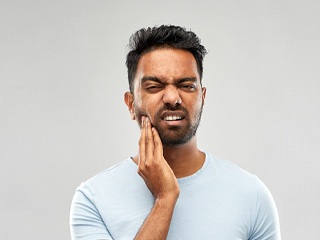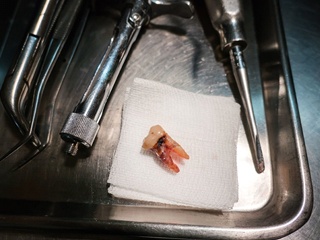Tooth Extractions – Edison, NJ
Setting the Stage For a Healthier & Stronger Smile
It’s not uncommon for dental decay, damage, or impacted wisdom teeth to occur, requiring a tooth extraction in Edison. Before we resort to this treatment, we try everything we can to save and preserve your natural tooth, because there’s no replacement that can compare. In cases that can’t be remedied with a root canal or filling, we may have to resort to removing the tooth in order to preserve the rest of your smile. Dr. David Rosenfeld has extensive experience extracting and replacing teeth, so you can rest assured that you’ll be in the best hands.
Signs You May Need a Tooth Extraction

Tooth extractions are necessary treatments for a variety of issues, which is why many patients experience different signs that they need the procedure. If you experience any of these problems, be sure to contact our office:
- A severe toothache caused by an infection that can’t be treated with a root canal.
- A visibly damaged or decayed tooth and we can’t treat it with a filling.
- There’s not enough room in your mouth to straighten your teeth.
- You have teeth growing under your gums that don’t have enough room to healthily and properly grow into your mouth.
- Gum disease has caused one or more teeth to become loose.
Types of Tooth Extractions

After we take images of your mouth and find out what issue is causing your symptoms, we’ll determine how we can fix it. We also offer sedation services to ensure that you remain comfortable and relaxed during the procedure. Depending on your unique situation, we may suggest one of the following types of tooth extractions.
Wisdom Tooth
Wisdom teeth, also known as third molars, can become stuck beneath the gum tissue, or they may not have enough room to grow into the mouth. If the issue isn’t addressed, it can increase your risk of developing an infection, gum disease, or even orthodontic issues and put your oral health at risk. As a preventive measure, we may recommend removing them.
Multiple Tooth
Severe decay, trauma, and genetics can cause different scenarios in which a multiple tooth extraction is necessary. When we remove teeth that are causing issues for you, we can preserve your oral health and help you regain the function and appearance of your grin.
Tips for a Fast Recovery

After your procedure, your dentist in Edison will give you some recovery tips to ensure that you heal quickly without complications. We often recommend some of the following practices to help your gums heal quickly and to handle any discomfort:
- If possible, take a couple of days to rest after your procedure.
- Eat soft foods and avoid chewing on the side of your mouth where your extraction site is located.
- Take over-the-counter pain medication to help minimize any tenderness and discomfort you feel.
- Apply a cold compress to minimize any swelling.
- Avoid drinking from a straw.
- Resume your regular dental hygiene routine, but be sure to avoid brushing the extraction site directly.
Understanding the Cost of Tooth Extractions

No one wants to have a tooth extracted, but sometimes this procedure is necessary to preserve the health of the rest of your smile. Something you may be wondering about is the cost of your treatment. During your consultation, we will discuss the cost of your tooth extraction in detail so that you don’t encounter any unnecessary surprises. Until then, here are some things to take into consideration.
Factors That Can Affect the Cost of Tooth Extractions

There are several different factors that need to be considered when determining the cost of your extraction. Here are the most prominent ones:
- Number of Teeth: The more teeth you need to have extracted, the higher the overall cost will be.
- Complexity: Depending on where your tooth is located in your mouth and whether it’s impacted, the cost will vary. Some extractions are much easier to perform than others, which take more time.
- Tooth Replacement: If you need to replace your missing tooth with a dental implant or another tooth replacement option, you should consider the cost of this as well.
Does Dental Insurance Cover Tooth Extractions?

In most cases, dental insurance plans will partially cover the cost of an extracted tooth at around 50% after your deductible has been met. However, there could be limits in place or a waiting period before the coverage kicks in. Every plan is unique, so it is best to confirm this with your dental insurance company first so that you don’t run into surprises. We are proud to be in-network with Delta Dental Premier (Clear Plan), Horizon Blue Cross Blue Shield (Traditional Plan), Cigna (Radius Plan), United Concordia (Elite Plan), and Guardian (Dental Guard Plan). We are also able to work with other providers, and we are happy to file claims on your behalf.
How to Make Tooth Extractions Affordable

If you don’t have dental insurance, this doesn’t mean that you will be left completely on your own when it comes to paying for your tooth extraction. We are happy to accept payments through CareCredit – a third-party financing company that can split the cost of your treatment into manageable monthly installments with little to no interest. To learn more about your financial options, don’t hesitate to contact one of our friendly team members.
Tooth Extraction FAQs

While we understand if you’re feeling uncomfortable about the prospect of receiving a tooth extraction, the team at Rosenfeld Dental Associates wants you to know you have very little to worry about. Dr. Rosenfeld is highly experienced in tooth removal and is happy to sit down with you one-on-one to discuss any concerns you may have. Below, you’ll find a handful of questions we’ve heard over the years on tooth extractions and what to expect before your visit.
Does Getting a Tooth Extracted Hurt?
Many people will actively avoid getting dental treatments done because they fear that they will cause them pain. While it may be surprising to hear, the process of removing a tooth causes very little discomfort (if any at all). In fact, most patients note that all they really experience is slight pressure, not pain. This is because we always numb your mouth in advance to ensure you don’t feel any sensations during the procedure. With that said, you can expect some mild soreness and discomfort afterwards. It is vital that you follow all your aftercare instructions as closely as possible to prevent infection, reduce puffiness, and promote healing. Call our office immediately if pain worsens or you begin to develop a fever.
What’s the Difference Between Tooth Extractions and Wisdom Tooth Surgery?
Both procedures involve removing a tooth, but they are quite different for a few reasons. For one, wisdom tooth extraction specifically refers to the third molars that erupt far back inside the mouth. With standard tooth extractions, we can take out any tooth that is either unviable or causing overcrowding. Wisdom tooth extractions are also closer to surgical procedures because they allow us to remove teeth that are impacted (caught underneath existing teeth) or trapped below the gum line.
Can I Leave the Space Empty After a Tooth Extraction?
While it may seem like you do not need to replace a tooth that was removed from the back of the mouth, the reality is many negative side effects can occur without a replacement. Just because no one can see your missing tooth doesn’t mean there won’t be noticeable changes to your facial appearance as a result. Plus, your chewing ability will be hindered if you don’t get it replaced, leading to poor nutrition and problems with digestion. Even speaking clearly can be difficult once you’re missing teeth. After your mouth has healed following your extraction, we’ll go over your options for rebuilding your smile.
Can I Smoke After Getting a Tooth Extracted?
You will need to avoid smoking, chewing tobacco, or vaping immediately after having your tooth extracted. This is because these habits can delay healing. We recommend abstaining from cigarettes for at least five days after your treatment (but ideally you should wait about two weeks). If you’re struggling to quit tobacco use altogether, please speak with us. Our goal is to help you achieve the best oral health possible, not pass judgement.

